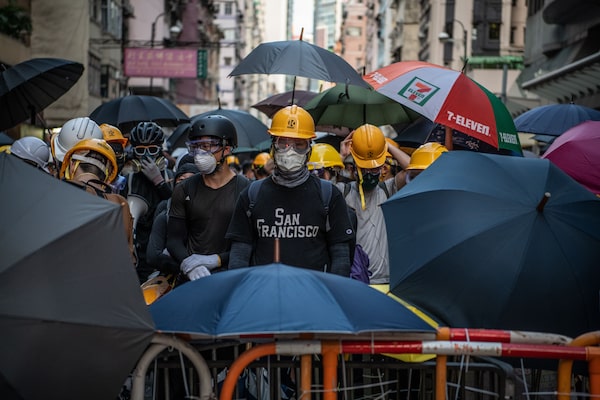
Masked demonstrators stand behind a makeshift barricade during a protest in Hong Kong July 28, 2019.Getty Images/Getty Images
Since November, 2021, hundreds of mostly young people who took part in anti-government protests in Hong Kong have participated in a “deradicalization” program designed to “enhance their sense of national identity” and guide them “back on the right track.”
That’s what the city’s secretary for security, Chris Tang, told lawmakers last month in hailing the program as a great success. In total, 474 inmates convicted of offences related to “black-clad violence” – the government’s term for the unrest that rocked the city in 2019 – have taken part in Project Path since it was launched 14 months ago.
While some former prisoners have denounced it as “brainwashing,” participants who spoke with The Globe and Mail said that gives the program too much credit, describing the materials as simplistic and intensely pro-China. A man surnamed Chan, who was convicted in late 2021 and among the first to enroll in Project Path, said he feigned interest and went along with it in the hopes of reducing his sentence.
“They were always telling me how great China was and how I should love China,” he said. “If we didn’t agree with it, we would have to remain in the program. Out of 10 people, maybe one person was convinced.”
Chan – whom The Globe is not identifying fully so he could speak freely about sensitive matters – said he continues to support independence for Hong Kong, a crime under the national security law that Beijing imposed on the city in response to the 2019 protests.
More than 200 people have been arrested under the law since it came into force in mid-2020, from high-profile opposition figures such as Apple Daily publisher Jimmy Lai to citizens who criticized the government on social media. Hundreds more have faced charges stemming from the 2019 protests or under colonial-era sedition legislation that has been resurrected and bolstered by the introduction of the security law. After the law’s passage, the government also reformed how elections work in Hong Kong, limiting the right to stand for office to “patriots” and essentially barring all traditional opposition parties.
While the extent to which COVID-19 rules – which for a time limited public gatherings to just two people – have affected the political situation in Hong Kong remains unclear, the one-time “city of protest” has been transformed by the security law, with public dissent stifled and mass rallies a thing of the past.
Early last year, as the Correctional Services Department (CSD) began to tout the success of the new deradicalization program, The Globe asked to see the materials it uses, under Hong Kong’s equivalent of the Access to Information Act. The request was denied on the grounds that such a disclosure “would harm or prejudice Hong Kong’s security, the security of the detention facility or prison, and the proper and efficient conduct of the operation of the CSD.”
In response to a months-long, ultimately unsuccessful appeal by The Globe to the city’s Ombudsman, CSD said in late December that the “widespread circulation” of materials used in the deradicalization program could be used by “individuals or parties with ulterior motives … to give an incomplete and inaccurate account of the programmes, or even worse, make unfair criticisms against them.”
Anything that might deter participation in the program could undermine rehabilitation efforts, the department said. “With the radical thoughts still in mind,” former prisoners “may continue to engage in activities that would pose risks to the security of correctional institutions, and public order and national security upon their release.”
Eric Lai, a non-resident fellow at the Centre for Asian Law at Georgetown University in Washington, D.C., said the reluctance to share details of the program could lead people to suspect it is “not consistent with the conventional citizenship and human-rights education that had lasted for decades in this city.”
He said the government should be more open to scrutiny in order to reassure the public that Hong Kong’s deradicalization programs do not follow practices used in mainland China against Uyghurs and other ethnic minorities and conform to the city’s responsibilities under international human-rights law.
The CSD’s response is also indicative of a general fear often expressed by the government and pro-Beijing politicians that, despite the concerted crackdown of recent years, further unrest is right around the corner.
In November, when anti-lockdown protests in mainland China sparked a handful of tiny sympathy demonstrations in Hong Kong, Mr. Tang, the security chief, claimed they were the “fledgling stage of a colour revolution.” The authorities also continue to spend millions on a largely black-box national security budget, with no end in sight.
“It is very unlikely that mass anti-government mobilization can be organized” on the scale seen before 2020, Dr. Lai said, pointing to the large numbers of key pro-democracy figures under arrest or in exile. “However, it appears that the Hong Kong authorities would not risk any chance of creating public discontent or grievance by revealing the materials of the ‘deradicalization’ program.”
 James Griffiths
James Griffiths